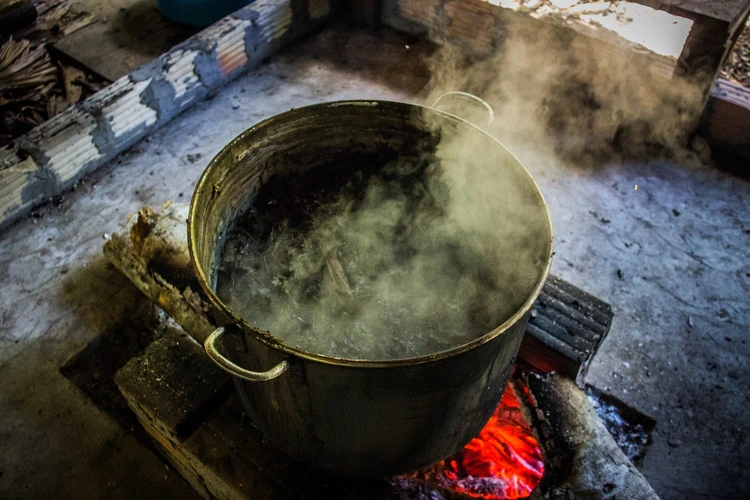What if a centuries-old Amazonian brew held the key to better mental health and well-being?
Ayahuasca, a psychoactive tea traditionally used in spiritual ceremonies, is once again making headlines after the most extensive study of its kind reveals promising associations between its use and improved mental health outcomes.
“Ayahuasca has been used for centuries by Indigenous communities for healing and spiritual purposes, but despite its growing global popularity, its effects on mental health in contemporary settings are not well understood,” study co-author and adjunct associate professor at Swinburne University in Australia, Daniel Perkins, told PsyPost.
“With more people around the world turning to ayahuasca (and related plant combinations containing these compounds) for personal growth, spirituality, and mental health support, we saw an opportunity to explore its potential benefits and risks in real-world settings,” Perkins said.
Ayahuasca, a traditional plant-based brew with roots in Amazonian shamanic practices, is no stranger to controversy or intrigue. Its psychoactive effects, often described as profoundly mystical, have drawn increasing interest among scientists and wellness enthusiasts alike.
Now, the largest-ever study on ayahuasca use has shed light on its potential mental health benefits, capturing the attention of researchers, policymakers, and the broader public.
The study, conducted via an online cross-sectional survey and encompassing 7,576 participants from over 50 countries, highlights a compelling link between ayahuasca consumption and improved mental health and well-being.
Published recently in the Journal of Psychoactive Drugs, this research marks a significant step in understanding how this ancient brew might offer modern solutions to psychological distress.
The study’s participants, with an average age of 41 and nearly equal representation of genders, reported a variety of experiences with ayahuasca. These ranged from traditional settings, such as indigenous ceremonies in the Amazon, to more contemporary or non-religious environments. Despite the diversity in contexts, the findings were strikingly consistent: those who consumed ayahuasca reported significantly better mental health outcomes across multiple measures.
Researchers analyzed the data using robust statistical methods, including multivariate linear regressions and generalized structural equation modeling.
They found that the frequency of ayahuasca use was positively correlated with better scores on mental health indices such as the Kessler Psychological Distress Scale (K10) and the Short Form Health Survey (SF-12 MCS). Psychological well-being change (PWG), a self-reported measure of perceived improvement, was also strongly linked to ayahuasca use.
These positive associations did not diminish over time, suggesting that the benefits of ayahuasca use could be long-lasting.
“Findings suggest that naturalistic ayahuasca use is associated with better current mental health status and enhanced psychological well-being for individuals with and without a history of mental illness, independent of community effects, with certain variables contributing positively or negatively to these effects,” researchers wrote.
Among the key variables contributing to the observed mental health improvements were the intensity of mystical experiences and the level of self-insight reported during ayahuasca sessions. Many participants described moments of profound clarity or spiritual revelation, which appeared to act as catalysts for psychological healing.
The study found that more substantial mystical experiences were consistently linked to better mental health outcomes and greater perceived well-being.
These findings mirror similar results from past studies, which have found that the experience of altered states of consciousness is key to the therapeutic potential of psychedelics.
“The consensus [is] you need the subjective effects, or the altered states of consciousness, to get the full and enduring benefits from these drugs,” George Fejer, a Ph.D. candidate at the University of Konstanz and co-author of a 2022 study on psilocybin told The Debrief.
Additionally, the study highlighted the importance of community and social support in facilitating these positive effects. Whether traditional or modern, group ceremonies provided participants with a shared space for processing and integrating their experiences.
“Notably, we found that mental health and well-being benefits were present even after controlling for the social and community aspects of ayahuasca use, which in themselves can enhance well-being,” Perkins explained. “Previous studies have not been able to separate out these effects.”
While the findings are promising, the study did not shy away from addressing the challenges associated with ayahuasca use. Acute episodes of extreme fear or distress, often referred to as “bad trips,” were reported by some participants.
These experiences, while typically temporary, could result in significant emotional discomfort. Furthermore, difficulties in integrating these intense experiences into everyday life were negatively associated with mental health outcomes.
Researchers cautioned that ayahuasca is not a “panacea,” highlighting the importance of proper preparation, ongoing support, and careful integration to maximize its benefits and ensure a positive outcome.
The study also emphasized the need for careful consideration of set and setting, including factors like the participant’s mindset and the environment in which the brew is consumed. Both play a crucial role in determining the outcome of the experience.
The context in which it is used is important—things like the strength of the mystical experience, personal insights gained, the support of a community, and how people process the experience afterward are key to these outcomes,” Perkins said. “At the same time, there are potential risks, including emotional distress and difficulty integrating the experience.”
The study’s findings come at a time of growing interest in psychedelics as potential treatments for mental health disorders. Substances like psilocybin (found in magic mushrooms) and MDMA (commonly known as ecstasy) are undergoing clinical trials with promising results. Ayahuasca, while not yet approved for therapeutic use in most countries, is increasingly being explored as part of this broader movement.
In recent years, anecdotal reports and smaller studies have suggested that ayahuasca may help alleviate symptoms of depression, anxiety, and post-traumatic stress disorder (PTSD). This new research builds on that foundation, offering the most comprehensive analysis of its effects on mental health to date.
Proponents argue that ayahuasca’s potential lies not only in its chemical composition but also in its ability to foster profound psychological and spiritual experiences. Unlike traditional antidepressants, many users claim that ayahuasca works on multiple levels—biological, emotional, and existential.
Despite its potential, the use of ayahuasca remains legally and logistically complicated in many parts of the world. In most countries, the brew’s psychoactive ingredient, DMT (dimethyltryptamine), is classified as a controlled substance. This has limited large-scale clinical research and posed ethical and safety challenges for those seeking to study or use it.
However, interest in ayahuasca continues to grow, with retreats and ceremonies becoming increasingly accessible—albeit in a legal gray area—in countries like Peru, Costa Rica, and Brazil. Some advocates hope such studies will pave the way for regulatory changes, enabling more rigorous research and safer use.
The study’s authors stress that while ayahuasca shows promise, it should not be seen as a standalone solution. Mental health is complex, and effective treatment often requires a combination of approaches, including therapy, lifestyle changes, and, in some cases, medication.
Still, the findings raise important questions about how traditional plant-based medicines might complement modern mental health treatments. For individuals who have not found relief through conventional methods, ayahuasca may represent a powerful alternative.
The findings of this recent study continue to signal a broader shift in the scientific community’s approach to psychedelics. Once dismissed as relics of counterculture, substances like ayahuasca are now being recognized for their potential to address some of the most pressing mental health challenges of our time.
As the stigma surrounding psychedelics continues to fade, researchers are hopeful that further studies will uncover new insights into how these substances work—and how they can be used safely and effectively.
“We want to learn more about how ayahuasca works—what aspects of the experience or environment make the biggest difference for improving mental health and well-being,” Perkins said. “The extent to which therapies inspired by ayahuasca may be able to provide a benefit for people with treatment-resistant mental health conditions in Western countries.”
Tim McMillan is a retired law enforcement executive, investigative reporter and co-founder of The Debrief. His writing typically focuses on defense, national security, the Intelligence Community and topics related to psychology. You can follow Tim on Twitter: @LtTimMcMillan. Tim can be reached by email: tim@thedebrief.org or through encrypted email: LtTimMcMillan@protonmail.com

